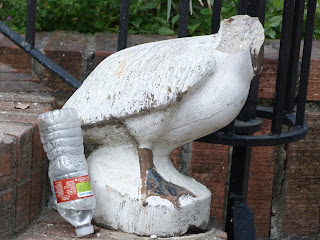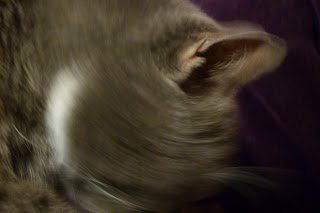I've enjoyed listening to a version of the Fairy Queen available on youtube - since this summer. I needed Purcell's music this summer as a respite to the talk radio our workers enjoyed. I needed calm and stateliness and delight. This production was performed at Citi de la Musique in Paris - so there are costumes and renaissance instruments - note a very large lute and those valveless trumpets. I was reminded that this was incidental music to a masque - a tableau to be played out as well as sung.

A beach presents a tableau as well. It is a performance. We don't often think of ourselves as performing. We consider that we exist, but to what end? We don't want an answer, or we settle for an answer that isn't worthy of the question. This is what Sabbath is for - to help us with that answer: if we abstain from busyness long enough, we have the opportunity to discern what is our soul's concern. Christ asks, What will we give in exchange for our soul? And we answer each day - Oh for a mess of porridge. That is, we act as if there were no question - where is the crowd going? And we take bearings for or against them.

We are trained to believe advertising. We have no choice but to believe those who are older than us when we are born. As we grow older we may begin to believe teachers, but still we don't know what it is that we believe. Finally one day we may say that we cut ties with all and believe only ourselves - and at this critical moment lose all necessary skepticism. We are the most necessary person to believe - and yet, we are the most likely to lie to ourselves. Nietzsche was getting at this.

People say they no longer believe in God - no longer believe in "fairy tales" as it were, but they don't examine how still in thrall they are. They have simply buried the source of thralldom deeper within themselves. For "fairy tales" (and how such an appellation betrays the shallowness of their thinking) they exchange the fantasy of their lives (which they are incapable of traversing themselves). To simply exchange one signifier for another is nothing. We each have an ultimate ground of being. It is the way we are built. The way we become.
Today, someone I admire said that I am a remarkable man. Which threw me a bit. I thanked him. It's kind to hear such a thing, as I feel lost in sameness most of the time. Too stuck in what I've not done, what did not work out, where I've had to back away from. And it's too easy to be angry. Or there's too much anger in me. Anger usually directed at myself, in the passive way we have, that it takes others to point out to us. But I am encouraged.

A key question in the Artist's Way is What Next? I stall in life and don't ask this. Unlike when I'm painting or drawing - which are so vital for me. When I'm pushing paint around or making lines, I'm always thinking of the next move. There is no time for being critical, for editing. And maybe that's the way life is meant to be lived. On TV and in the papers, lives are always being analysed for flaws. As if people should have known instantly to do or not do something. The punishing super ego seems like the voice of our media today. At some point people have to shut it down. There is no analysis, no search for who to blame, who to take the fall, to punish: there is only what next? What next if we approached people's lives like this? One mistake, one gaffe, and it's curtains for good men and women.
I've no more words.
I have to find a way forward. Keep trying things and something will click. As Jami tells me, I have to talk with several crucial people. As my therapist tells me, I have to try things even when I'm not 100 percent certain of them. It's better to go in cold than to spend time in speculation.
What next?
Who is interested in art and theology and sees what I might do in them? How I bring them together.
The gator in orant, lifts his song to the sky.
What next?
What next?






















































